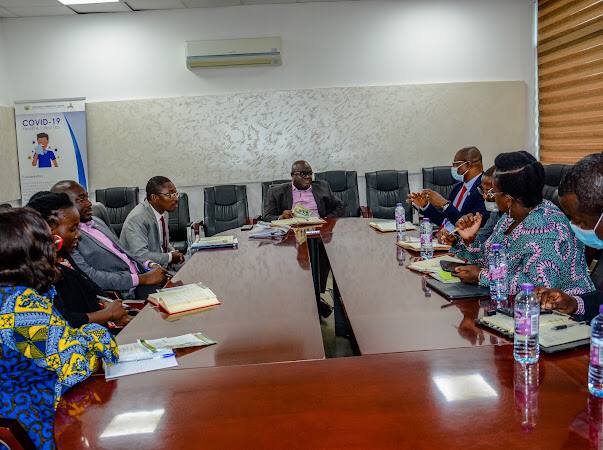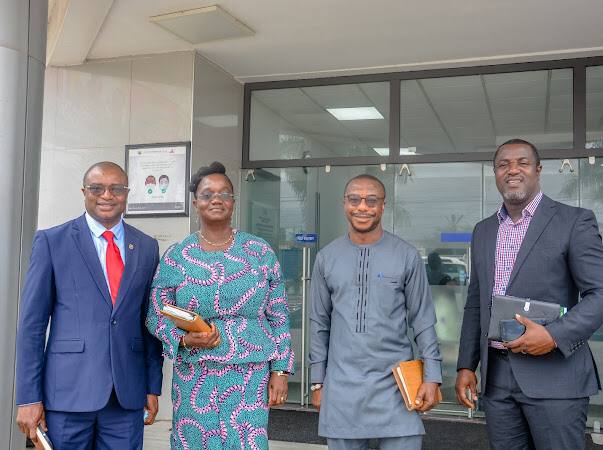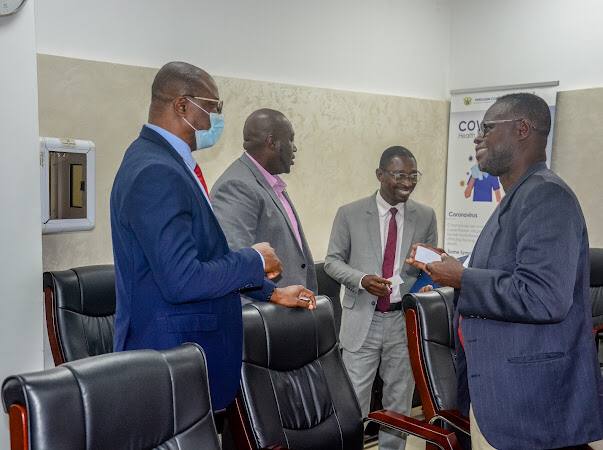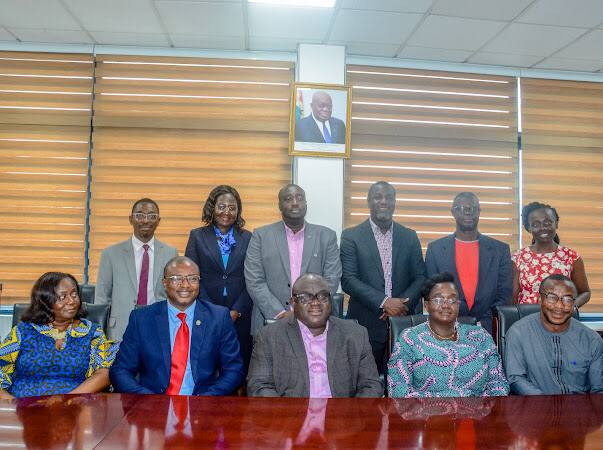Management of the University of Environment and Sustainable Development, (UESD), and the Petroleum Commission are in dialogue to form a partnership. This was an outcome of a meeting held between teams from both institutions.The Vice-Chancellor, Prof. Eric Nyarko-Sampson accompanied by his team called on the Management of the Petroleum Commission in Accra, as part of UESD’s programmed visits to institutions and organizations with whom it shares a similar vision.
He was accompanied by the Ag. Pro-Vice Chancellor, Prof. Edward Wiafe-Debrah, the Registrar, Mrs. Mary Abena Agyepong and the Ag. Dean of the School of Environment and Sustainable Development, SSD, Prof. Anthony Amoah.
The local Content Director of the Commission, Mr. Kwaku Boateng welcomed the UESD delegation and three others in their conference room.

Giving a brief profile of the University and its programmes on offer, Prof. Nyarko-Sampson among other things said, UESD, is a public university which offers Bachelor of Science Programmes and currently operates two out of its five Schools. He indicated that the third School, the School of Built Environment will be added in the 2022/23 academic year, beginning with three (3) programmes: BSc. Construction Management, BSc. Urban Designs and BSc. Sustainable Architecture.
He continued that the Petroleum Commission’s mandate of ensuring efficient conduct of upstream petroleum resources and providing for related purposes is in tandem with UESD’s core value of protecting the environment.
In order to equip students with the requisite tools, expertise and knowledge, all the programmes it runs, provide students with the opportunity to interact with experts in industry through internship and practical training.

Similarly, the UESD has the capacity to organize tailor-made courses for staff in Public Health, Energy Sustainability and Environment-related courses.
On the University’s relationship with its communities, Prof. Nyarko-Sampson said, through the Community Engagement Projects and Innovations Unit, (CEPIU), it has held forums for farmers on improved ways of farming amidst climate change and has also engaged some Basic schools under the institution’s maiden Community Development Challenge, where the pupils were asked to identify a challenge in their communities and device strategies to address them, through easy, drawing or poster. He said, the feedback from the pupils was commendable and hopes to come out with more engaging programmes with them.
Prof. Nyarko-Sampson also cited a visit to the local beads factory which produces beads from glass bottles and how the University is involved in introducing innovative ways of producing it.
He called for partnership in research, data sharing, human resources training and capacity building.
Complimenting the Vice-Chancellor’s submission, the Dean of the School of Sustainable Development, Prof. Anthony Amoah said, programmes at UESD have been designed with industry at heart. Answering a question on the difference between Development Studies in other universities and Sustainable Development at UESD, Prof. Amoah explained that Sustainable Development is an extension of Development Studies with the inclusion of the Sustainable Development Goals, and this pitches graduates of UESD over their counterparts.

For her part, the Registrar, Mrs. Mary Abena Agyepong, was optimistic that future collaboration between the two (2) institutions will be fruitful.
Responding to discourses from the UESD team, Mr. Boateng stated that the primary mandate of the Petroleum Commission is to regulate all companies operating in the upstream centre including exploration and production companies.
He said, the Commission has over the years collaborated with academic institutions to design curricula relevant to industry and one that meets the current requirements of trends by organizations.
He continued that, through the Universities’ requests, the Commission makes available specialized resource personnel for teaching in the Universities. It also supports tertiary institutions with equipment such as software, Information Technology and infrastructure and allows for internship and attachment programmes as well as provides an endowment fund for the training of people to acquire specialized skills under the Accelerated Oil and Gas Capacity (AOGC) programme.
He further stated that Energy, Oil and Gas production and exploration companies have an interface with the environment, thus, the need to research ways of reducing carbon fingerprints in the environment.
At the end of the meeting, a team was formed to look into the possible areas of collaboration between the two (2) institutions which will necessitate a Memorandum of Understanding, (MoU) to be signed in the not-too-distant future.

